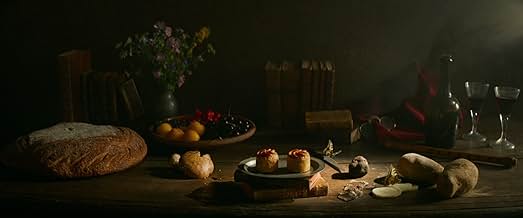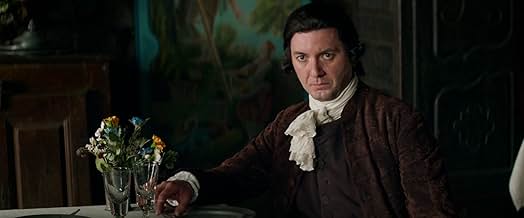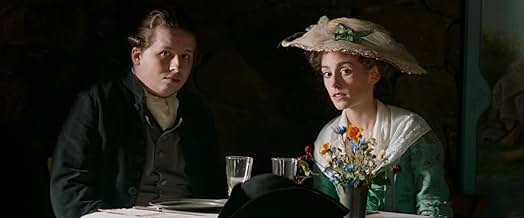VALUTAZIONE IMDb
7,0/10
6746
LA TUA VALUTAZIONE
Francia, 1789, poco prima della Rivoluzione. Con l'aiuto di una giovane donna sorprendente, uno chef licenziato dal suo padrone trova la forza di liberarsi dalla sua posizione di servitore e... Leggi tuttoFrancia, 1789, poco prima della Rivoluzione. Con l'aiuto di una giovane donna sorprendente, uno chef licenziato dal suo padrone trova la forza di liberarsi dalla sua posizione di servitore e apre il primo ristorante.Francia, 1789, poco prima della Rivoluzione. Con l'aiuto di una giovane donna sorprendente, uno chef licenziato dal suo padrone trova la forza di liberarsi dalla sua posizione di servitore e apre il primo ristorante.
- Regia
- Sceneggiatura
- Star
- Premi
- 3 candidature totali
Recensioni in evidenza
After chef Manceron is sacked by his fussy aristocratic boss, a woman appears out of nowhere and asks him to let her be an apprentice chef. He is unwilling as he thinks that chefs should all be males. She hands him some money for her tuition fees and finally pursuades him to teach her. He teaches her how to identify plants suitable for eating, and how to cook animals. She becomes an excellent cook, and we see some of the delicious looking food that she produces. We learn about the poverty of the local peasants and how many are starving. The arrogance and condescending attitude of the Duc de Chamfort and his fellow aristocrats give us a taste of the unfair treatment given to the poorer people which eventually led to the French Revolution.
It's set in 1789 France just before the Revolution in a rural fictional dukedom of Chamfort. It tells the story of the invention of the modern restaurant concept in a time when only the nobility ate well.
Pierre Manceron (Grégory Gadebois) is the master chef for Le duc de Chamfort (Benjamin Lavernhe). Chamfort loves Manceron's cooking, but insists that he stick to set menus and not be creative in his recipes. When Manceron creates a little appetizer he calls "Délicieux" that contains potato, Manceron is dismissed after refusing to apologize for serving such a dish.
He returns to his rural home with his son, Benjamin (Lorenzo Lefèbvre), and together with an elderly mentor, Jacob (Christian Bouilette) runs a relay (postal) station that also serves basic food. Suddenly, a mysterious woman appears and asks to be Manceron's cooking apprentice. Louise (Isabelle Carré) claims to a former jam maker, but Manceron believes she actually must have been a prostitute. He refuses to accept her for a time, but ultimately agrees to train her.
They create dishes based on local produce and local livestock, and begin to attract a significant clientele. The duke is intrigued, misses his cook who he has not been able satisfactorily to replace, and offers to stop by for a traditional feast. If successful he'll invite Manceron back into service.
The film then takes a sharp departure into the pre-Revolution politics of the day, we learn the truth of Louise's background, and the story unfolds in unexpected ways.
This is beautifully-filmed movie. The scenes of food preparation reminded me of "Babette's Feast." The unfolding interaction between Manceron, Benjamin (who is pro-class struggle), and Louise is well done. The sharp departure two-thirds of the way into the movie started to to make it go off the rails for me. I expect minimal plausibility in historical films; this one drifted too far in its link to the French Revolution and ended somewhat unsatisfactorily.
Still, the cinematography and the initial storyline made it a good watch.
Pierre Manceron (Grégory Gadebois) is the master chef for Le duc de Chamfort (Benjamin Lavernhe). Chamfort loves Manceron's cooking, but insists that he stick to set menus and not be creative in his recipes. When Manceron creates a little appetizer he calls "Délicieux" that contains potato, Manceron is dismissed after refusing to apologize for serving such a dish.
He returns to his rural home with his son, Benjamin (Lorenzo Lefèbvre), and together with an elderly mentor, Jacob (Christian Bouilette) runs a relay (postal) station that also serves basic food. Suddenly, a mysterious woman appears and asks to be Manceron's cooking apprentice. Louise (Isabelle Carré) claims to a former jam maker, but Manceron believes she actually must have been a prostitute. He refuses to accept her for a time, but ultimately agrees to train her.
They create dishes based on local produce and local livestock, and begin to attract a significant clientele. The duke is intrigued, misses his cook who he has not been able satisfactorily to replace, and offers to stop by for a traditional feast. If successful he'll invite Manceron back into service.
The film then takes a sharp departure into the pre-Revolution politics of the day, we learn the truth of Louise's background, and the story unfolds in unexpected ways.
This is beautifully-filmed movie. The scenes of food preparation reminded me of "Babette's Feast." The unfolding interaction between Manceron, Benjamin (who is pro-class struggle), and Louise is well done. The sharp departure two-thirds of the way into the movie started to to make it go off the rails for me. I expect minimal plausibility in historical films; this one drifted too far in its link to the French Revolution and ended somewhat unsatisfactorily.
Still, the cinematography and the initial storyline made it a good watch.
From the first scene I was delighted by the food and characters. While the movie moves forward you get more and more attached. It's a great, creative story. Contains love, passion and a great narrative.
Delightful, pure, with great emotional payoff. I thoroughly enjoyed it. A take on aristocracy with French characteristics. Plus points for helping me improve my French listening.
A very nice and pleasant story that puts food and the love of cooking in marvelous light. Good acting, good visuals and some funny moments.
Lo sapevi?
- QuizVery loosely based on true events as the first restaurants in France around 1789 emerged in Paris, not the countryside. Furthermore, the movie is not historically correct either by claiming that the first restaurant was created in France. The modern concept of a restaurant was already happening 600 years before in China circa 1100.
- Curiosità sui creditiAt the end of the credits, there is a short clip of a table, with two 'Delicious' set amidst items of food, flowers, wine, etc, while some butterflies flutter about.
I più visti
Accedi per valutare e creare un elenco di titoli salvati per ottenere consigli personalizzati
- How long is Delicious?Powered by Alexa
Dettagli
Botteghino
- Budget
- 5.000.000 € (previsto)
- Lordo in tutto il mondo
- 8.371.523 USD
- Tempo di esecuzione
- 1h 52min(112 min)
- Colore
- Proporzioni
- 2.39 : 1
Contribuisci a questa pagina
Suggerisci una modifica o aggiungi i contenuti mancanti






























